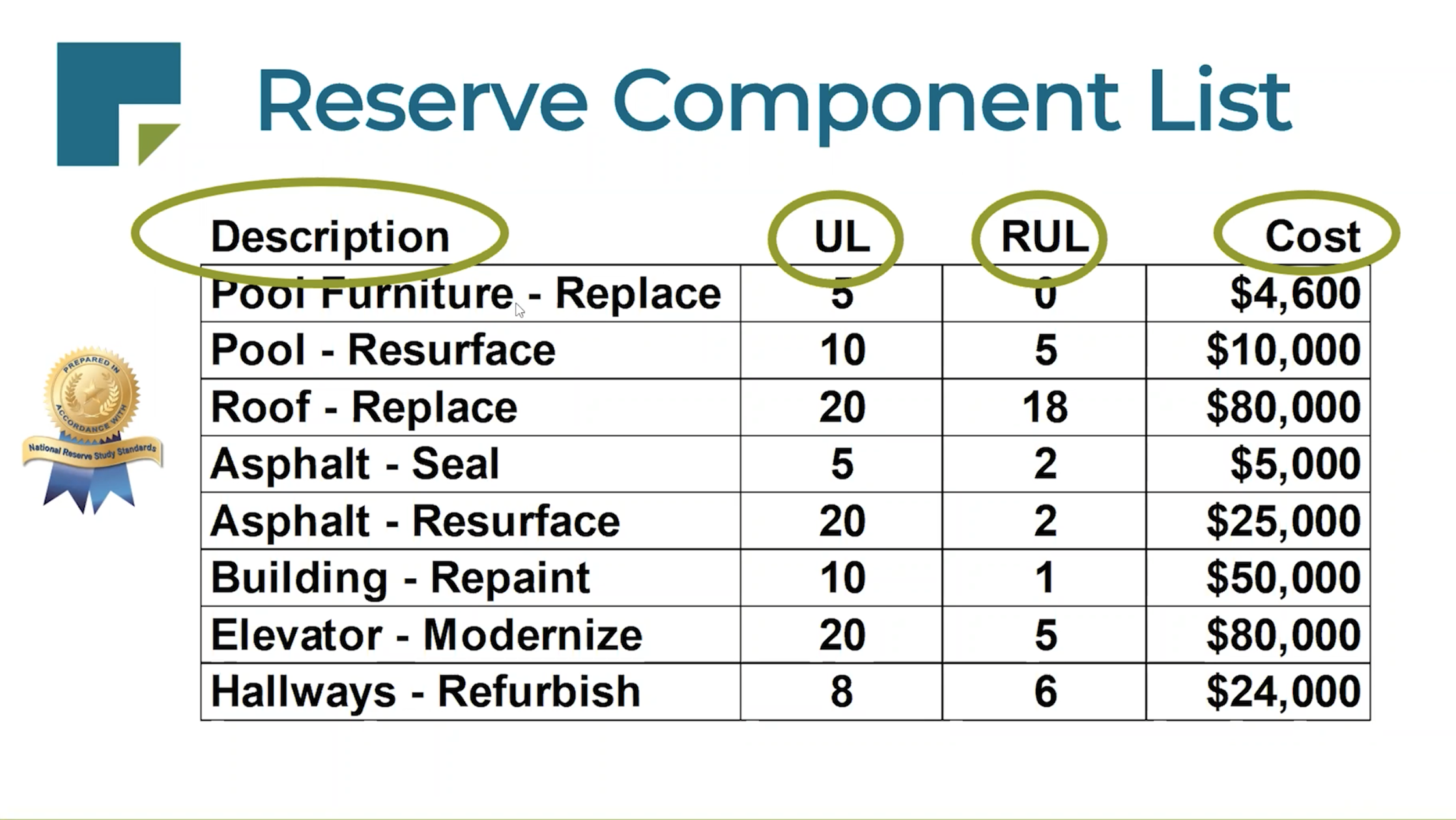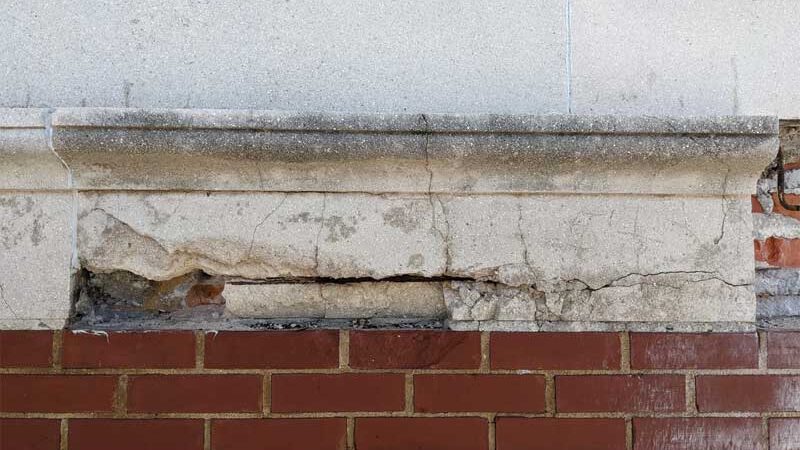Every year, hardworking HOA board members receive a HOA Reserve Study report, and its hefty content can feel like trying to decode a foreign language. Understanding it is crucial to run your association smoothly and effectively. Let’s break down your results so you’re equipped with everything you need to support your community!
The Purpose of a Reserve Study
The first step to accurately understand your HOA Reserve Study is to know its original purpose. It gives your association an honest assessment of where it stands, both physically and financially, and outlines a step-by-step plan for your community’s future. If followed diligently, it will help your association avoid the unnecessary burdens of special assessments and deferred maintenance.

Who
Start by identifying the credentials of the person who prepared the report. Ideally, you want someone with an RS (Reserve Specialist) or PRA (Professional Reserve Analyst) credential behind their name. This indicates that the individual has plenty of experience and is familiar with the nuances of the reserve study, from component analysis to multi-year funding planning.
What
Navigating through your reserve study can be daunting with its thick sheaf of papers and tables, so let’s break it down into parts:
- Executive Summary: The key findings and recommendations are usually at the beginning of the report. This section gives a snapshot of the association’s physical and financial health, including the beginning and ending reserve balances, and the percent funded. A quick review of this section will give you an overview of the state of your HOA Reserves.
- Detailed Inventory: The next sections provide a more detailed look into the data. For instance, the report may include an inventory of community assets with details about their condition, maintenance requirement, and replacement responsibilities.
Your report typically provides three primary results – the component list, the reserve fund strength, and the funding plan. These are the 3 key aspects to look out for.
- The Component List: The component list details the physical status of your association. It identifies what assets need maintenance or replacement, covering everything from minor repairs to major replacements and upgrades. Every project is listed with its useful life and current cost, which are crucial when planning for future expenses.

- Reserve Fund Strength: This tells us about the financial starting point of the association. Measured by the percent funded, it’s the ratio of physical deterioration to your reserve cash. If your association is 0-30% funded, you’re likely facing a financial risk. On the other hand, if you’re above 70% funded, you’re in a healthy position. Understanding where your association stands can help you prepare for the future and avoid special assessments.
- Reserve Funding Plan: This is the roadmap that will guide your HOA in saving funds for upcoming expenses. Usually, reserve funding constitutes 15 to 40% of an association’s total budget. The funding plan outlines how the association plans to accumulate the required funds for future repairs and replacements.
When
The report’s validity is another critical factor. Look for the effective start date and the expiration date to know how current the report is. Remember, a reserve study report is perishable – its observations, reserve balances, and recommendations become less relevant with time.
Why
Knowing the ‘why’ will help you understand the reserve study’s objective. It helps the association see the future clearly and plan for upcoming expenses. Your results equip you and your team the knowledge you need to avoid special assessments for projects that are deteriorating in plain sight.

When to Adjust Your Budget
If your reserve study results indicate that your association is in a weak or fair spot, it might be time to consider making some budget changes. Adjusting your budget according to the recommendations of the reserve study can strengthen your position to tackle upcoming expenses.
It is important to maintain a margin in your reserve fund. Unpredictable circumstances like a severe storm or inflation can result in unexpected expenses. Having some margin in the fund ensures you’re prepared for the inevitable.
Your HOA Reserve Study All Year Long
Your reserve study can act as your HOA’s to-do list for the entire year. It details all the projects that need attention, allowing your board to plan strategically and delegate responsibilities early. With this advanced planning, the board can avoid getting overwhelmed by numerous simultaneous projects and ensure that no necessary task gets delayed.
Some expenses are foreseeable because they are listed in your reserve study, while others can catch you by surprise. When an unexpected expense arises, your reserve study is a vital tool in deciding whether to pay for it from operating funds or reserves.

For example, your reserve study might indicate that you need to repair the deck, the siding, or the roof in the coming year. In such cases, the board can assign these tasks to the right people from the get-go, ensuring smooth operation and project completion.
The Cost of Delaying Projects
One key point to remember is that deferring projects doesn’t equate to saving money. Delayed projects don’t disappear; instead, they merely get postponed to the next fiscal year. In many cases, these deferred tasks end up costing the association more money.
An ostensibly simple project, like painting and sealing a building, can lead to more serious issues such as dry rot if it’s delayed. This kind of neglect will result in additional construction repair costs. Deferring projects often makes them 20% to 50% more expensive when you add in inflation.
What To Do With Unexpected Expenses
What if you encounter an unexpected expense that doesn’t feature in your reserve study? To determine whether this expense should be covered by operating funds or reserves, consider the National Reserve Study Standards three-part test:
- Is it the associations obligation?
- Can it be reasonably anticipated?
- Is it a significant cost?
In cases of uncertainty, consult your reserve study provider. Their guidance will help ensure that your reserve funds aren’t misused or depleted unnecessarily.

Reserves V.S. Operating Budget
Your reserve funds are precious resources, earmarked for necessary reserve projects. Avoid draining them for other things, especially not towards the operating budget. For example, while insurance premiums may have risen in the past year, your roof is also becoming more expensive and deteriorating. Using all your reserve funds for insurance premiums or other non-reserve projects may put you at risk in the long term.
Keep in mind that reserve funds are not just for the projects of today, but also for the unexpected expenses of the coming months. Be proactive, plan strategically, and remember, it’s crucial not to delay necessary projects for short-term savings.
What To Do with Your Reserve Study
We understand the complexities of financial management within your community can feel hectic to say the least. However, with the right tools and understanding, navigating through these obstacles becomes more manageable. Rely on your HOA Reserve Study and reserve specialist as guides to help you make informed decisions. We’ll outline the big picture and the 6 things to do with your reserve study moving forward:

1: Identify the Challenges
Being part of an HOA community involves overcoming constant change – from the physical conditions of structures, changing costs, the economy, unexpected weather conditions, and balances. The role of your reserve study is to help you navigate these changes effectively.
2: Understand the Role of Your Reserve Study
An HOA reserve study is not a cure-all solution, but a dependable model to follow. It provides a clear snapshot of your association’s financial status at a specific point in time, helping you make the right decisions.
3: Adapt to Changes
As you use your reserve study, it’s important to remember that it’s not a static tool. The study will need to adapt and evolve to reflect the continually changing financial needs of your community. That is why there are 3 different types (full, update with-site visit, update no-site visit) of reserve studies to suit those needs. Talk to a reserve study provider to find out what you need!
4: Measure Success
Your ultimate goal is to achieve a stable financial state in your HOA community. This means avoiding special assessments, completing projects on time, maintaining a funded percentage above 70%, and spending reserves wisely. Remember to differentiate between your reserve and operating fund, as each serves a different purpose. Learn more about what percent funded means here.
5: Build a Sustainable Association
The end goal is to foster a sustainable community where pride of ownership is evident, and where funds are available to maintain and increase property values. Keep the following key results of your HOA Reserve Study results in mind: The component list, reserve fund strength (percent funded), and the funding plan. Do not let it collect dust! Use it to guide you towards wise decisions and the sustained growth of your association.
6: Leveraging Our Online Funding Tool
To further assist in your journey, our online funding tool, uPlanIt is a helpful tool that comes with your reserve study. It will help you envision different financial scenarios and their potential impact on your reserves. Click here to test your budget ideas and see how you will be affected.
Communicating Your HOA Reserve Study Results
As an HOA board member, you have the role to meet the needs of your association and ensure its viability for the future. Delaying projects to save on immediate costs can often lead to long-term financial consequences and could negatively impact your community’s property values. You’re not just dealing with budgets and numbers, but the collective dreams and investments of your neighbors.

The Challenge
Communicating your HOA reserve study results is a critical part of your role. It’s not just about sharing the numbers; it’s about addressing genuine concerns from homeowners and creating a stable, thriving future for your community.
Your Reserve Study Strategy
To effectively communicate the reserve study results, follow this four-step plan:
Clarify the Purpose: Remember, the HOA Reserve Study doesn’t create expenses; it merely highlights them. It accurately portrays the condition of your association, giving you a tool to plan and prepare for future costs.
Choose Your Language Carefully: Frame the reserve funding as a necessary step for maintaining the community, rather than an optional, emergency fund. It’s about everyone contributing to the community’s continued stability.
Highlight the Benefits: Talk about the rise of property values in associations with well-funded reserves. Show your community that this isn’t just a cost—it’s an investment.
Break Down the Numbers: Put the daily cost of reserve funding into perspective. Once homeowners realize it’s no more than their daily cup of coffee, their perception may shift from concern to understanding.

Your HOA Goals
Effective communication can change the perception of your community. When homeowners realize the reserve study is a tool to protect and increase their home’s value, they’ll see it in a different light. You can help create a forward-thinking community that understands the importance of planning for a prosperous future.
The goal is to lead your community towards a stable future. Remember, understanding your HOA reserve study isn’t just about deciphering financial jargon, it’s about safeguarding the future of the entire community. Use your results and a reserve study specialist to secure your association’s future and make decisions that ensure long-term success.
With Association Reserves by your side, you have access to a wealth of resources and information. We’re here to assist you every step of the way. Check out the rest of our articles here, or subscribe to our YouTube channel to follow along on future HOA tips like this every week!
